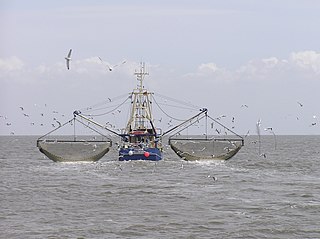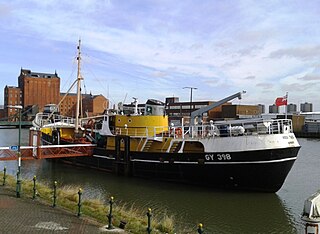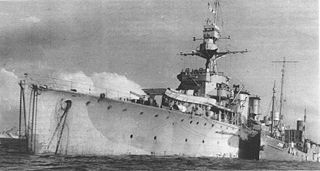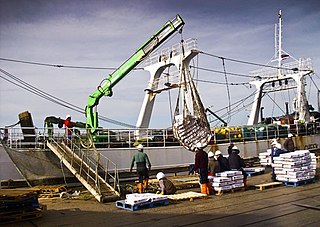Facts
In October 1932, Maritime National Fish contracted to hire St. Cuthbert, a steam trawler fitted with an otter trawl, from Ocean Trawlers Ltd. The hire was to last for twelve months. Both parties knew that the use of such a vessel without a license from the Minister was illegal, under the Fisheries Act (c. 73 Revised Statutes of Canada) 1927. Subsequently, Maritime National Fish applied for five licenses from the Canadian government, for the five trawlers they were using. However, only three were granted. Maritime National Fish did not name the St. Cuthbert from Ocean Trawlers as one of the licensed vessels, and refused to go through with the hire, on the grounds the contract was frustrated. At first instance, Maritime National Fish prevailed, the trial judge holding that it was "not unreasonable to imply a condition to the effect that if the law prohibits the operation of this boat as a trawler the obligation to pay hire will cease".

A fishing trawler is a commercial fishing vessel designed to operate fishing trawls. Trawling is a method of fishing that involves actively dragging or pulling a trawl through the water behind one or more trawlers. Trawls are fishing nets that are pulled along the bottom of the sea or in midwater at a specified depth. A trawler may also operate two or more trawl nets simultaneously.

Commercial fishing is the activity of catching fish and other seafood for commercial profit, mostly from wild fisheries. It provides a large quantity of food to many countries around the earth, but those who practice it as an industry must often pursue fish far into the ocean under adverse conditions. Large-scale commercial fishing is also known as industrial fishing. This profession has gained in popularity with the development of shows such as Deadliest Catch, Swords, and Wicked Tuna. The major fishing industries are not only owned by major corporations but by small families as well. The industry has had to adapt through the years in order to keep earning a profit. A study taken on some small family-owned commercial fishing companies showed that they adapted to continue to earn a living but not necessarily make a large profit. It is the adaptability of the fishermen and their methods that cause some concern for fishery managers and researchers; they say that for those reasons, the sustainability of the marine ecosystems could be in danger of being ruined.

James Richard Atkin, Baron Atkin,, known as Dick Atkin, was a lawyer and judge of Irish, Welsh and Australian origin, who practised in England and Wales. He always thought of himself as a New South Welshman, and was President of the London Welsh Trust from 1938 to 1944.

A fishing vessel is a boat or ship used to catch fish in the sea, or on a lake or river. Many different kinds of vessels are used in commercial, artisanal and recreational fishing.

The Ross Group was a British food company founded in Grimsby, England in 1920.
Carl Ross was a fishery entrepreneur and architect of the forerunner company to Young's Bluecrest, the UK's largest frozen fish producer.

A factory ship, also known as a fish processing vessel, is a large ocean-going vessel with extensive on-board facilities for processing and freezing caught fish or whales. Modern factory ships are automated and enlarged versions of the earlier whalers and their use for fishing has grown dramatically. Some factory ships are equipped to serve as a mother ship.
Implied terms in law refers to the practice of setting down default rules for contracts, when terms that contracting parties expressly choose run out, or setting down mandatory rules which operate to override terms that the parties may have themselves chosen. The purpose of implied terms is often to supplement a contractual agreement in the interest of making the deal effective for the purpose of business, to achieve fairness between the parties or to relieve hardship.
In English law, a vitiating factor in the common law of contract is a factor that can affect the validity of a contract. The concept has been adopted in other common law jurisdictions, including the USA.
Frustration is an English contract law doctrine that acts as a device to set aside contracts where an unforeseen event either renders contractual obligations impossible, or radically changes the party's principal purpose for entering into the contract. Historically, there had been no way of setting aside an impossible contract after formation; it was not until 1863, and the case of Taylor v Caldwell, that the beginnings of the doctrine of frustration were established. Whilst the doctrine has seen expansion from its inception, it is still narrow in application; Lord Roskill stated that it is "not lightly to be invoked to relieve contracting parties of the normal consequences of imprudent bargains".

HMS Sir Galahad was a trawler built for the British Royal Navy in 1941. Post war it was sold into civilian service and was wrecked in 1957 after running aground off the Isle of Mull.

Ross Tiger is a traditional side-winder fishing trawler that was converted into a museum ship in 1992. She is currently berthed in Alexandra Dock at her home port of Grimsby, close to the site of the former PS Lincoln Castle. She forms the star attraction of North East Lincolnshire County Council's National Fishing Heritage Centre since restored and opened to the public in 1992. As Grimsby's last traditional sidewinder 'conventional trawler', she represents a now virtually extinct breed of vessels that once made up the largest fishing fleet in the world.

The Fishery Protection Squadron is a front-line squadron of the Royal Navy with responsibility for patrolling the UK's Extended Fisheries Zone. The squadron, with headquarters at Portsmouth Naval Base, are equipped with four River-class patrol vessels; three are based in the UK, while HMS Clyde is based in the Falkland Islands.

Great Peace Shipping Ltd v Tsavliris (International) Ltd [2002] EWCA Civ 1407 is a case on English contract law and on maritime salvage. It investigates when a common mistake within a contractual agreement will render it void.

Wake-Walker v SS Colin W Ltd is a Canadian admiralty law case concerning the issue of inevitable accident. The case was decided by the Judicial Committee of the Privy Council, in an appeal affirming a ruling by the Supreme Court of Canada.

HM Trawler Alvis was a British trawler that was taken up from trade and used by the Royal Navy during the Second World War. She was returned to the fishing industry at the end of hostilities in 1945.

NOAAS David Starr Jordan was an American fisheries research vessel that was in commission in the National Oceanic and Atmospheric Administration (NOAA) fleet from 1970 to 2010. Prior to her NOAA career, she was in the United States Fish and Wildlife Service's Bureau of Commercial Fisheries fleet from 1966 to 1970 as BCF David Starr Jordan.

Fishing in the Falkland Islands contributes to the local economy. The official body responsible for the sustainable development of fisheries in the Falklands is the Falkland Islands Fisheries Department (FIS), established in 1987, It is reported that during 2013 the Loligo fishery had the best results.

Lillian Bilocca was a British fisheries worker and campaigner for improved safety in the fishing fleet as leader of the "headscarf revolutionaries" – a group of fishermen's family members. Spurred into action by the Hull triple trawler tragedy of 1968 which claimed 58 lives, she led a direct action campaign to prevent undermanned trawlers from putting to sea and gathered 10,000 signatures for a petition to Harold Wilson's government to strengthen safety legislation. She threatened to picket Wilson's house if he did not take action. Government ministers later implemented all of the measures outlined in the charter.
















